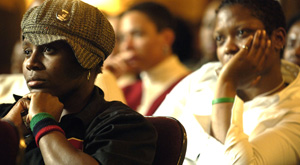|
||
      |
Feminists call for hip-hop reform
Hordes of thong-clad women, groped by rapper 50 Cent, flashed across the movie screen, and the filmmaker made her point: “We live according to the images we see in hip-hop culture.”

Conference-goers listen to panelists discussing female objectification
in hip hop.
Showing her latest documentary on the use of sexuality in hip hop, panelist and Canadian producer Alison Duke helped open the national conference Feminism and Hip Hop, hosted by the Center for the Study of Race, Politics, and Culture (CSRPC). Shifting between International House and Mandel Hall April 7–9, the conference attracted more than 900 people and addressed sexuality, drugs, crime, misogyny, consumerism, and nihilism in hip hop—urban dance and rap music and the accompanying fashion, style, and culture.
More than 40 panelists, including activists, academics, rap artists, models, music producers, and journalists, debated how hip hop has influenced notions of gender, power, and racial consciousness in youth culture. The crowd of dreadlocked hip-hop artists, highbrow academics, and backpack-toting students regularly traded questions and opinions with the speakers—which was part of the aim. “Our goal here is to engage scholarship with activism on the ground,” said Cathy Cohen, director of the CSRPC, welcoming the group. “We want to get a conversation going by confronting images of hip hop and how the feminist agenda relates to that narrative.”
The first panel, Hip Hop and Feminism on Screen, raised several topics repeated throughout the weekend. “I love hip hop, but I feel at times that hip hop doesn’t love me back,” began Tamika Guishard, a documentary filmmaker and seventh-grade school teacher in New York City. Inspired after noticing the music’s impact on her female students, she made the eight-minute film Hip Hop Gurlz to investigate both the misogyny in videos and their effect on young women.
“It seems like hip-hop videos today only use a beat, a few lyrics, and some objectified women,” Guishard said. She stressed that young girls digest those messages. “How do you as a woman identify with hip hop if you are being talked about in a certain way?” she asked, referring to hip-hop artists commonly calling women “hos, tricks, and bitches.”
“Girls do what they see in videos,” a black, pre-teen girl said in the film. “If I can get skinny, dress, and dance like that, I can be in videos too.”
“Hip hop influences the way these young women perceive themselves and their importance in relationships,” Guishard concluded. “The negative image of women in these videos has got to do something to their self-esteem.”
The next documentary, the 12-minute Booty Nation, produced by Duke, highlighted how the industry uses the black female body as a source of material and sexual status. “Where does this objectification and anger against women come from?” she asked. Shouts of affirmation from the audience roused her to carry on.
One answer emerged across the panelists: the capitalist influence of the corporate enterprise on the music industry. Music videos, Duke argued, propagate a mythology of the larger-than-life persona, hypermasculine bravado, and the glamorized, rough-cut thug. Hip-hop videos create the illusion that historically marginalized groups can realize the American dream.
Coupled with this machismo, the panelists said, is the use of sexuality as a commodity. Sex and violence sell, New York filmmaker Rachel Raimist affirmed after screening her 30-minute film, Nobody Knows My Name, which profiles six women attempting to reform the male-dominated industry. “The use of sex in the corporate industry is killing hip hop,” the female rap artist Medusa argued in the film. The formula of objectification, said Raimist, initiated by rock and roll, has been transported to the hip-hop industry. “If hip hop is all a business,” she asked, “then whom are you marketing to?”
Enter the other sex. New York native Byron Hurt, the only male panelist, offered another point of view through his 2005 documentary Beyond Beats and Rhymes, which points out the complexities of American black masculinity. The former Marine and antisexism activist attributed hip hop’s antagonism toward women to a fear of feminization and homosexuality. “The concept of hardness in hip hop acts as kind of psychic armor,” Hurt said. “Hip hop is ego driven and assertive; you need a tough aesthetic to have credibility.”
Concluding the panel, the Race Center’s Cohen argued that hip-hop should not be confused with the corporate music industry. “Hip-hop culture encompasses breakdancing, graffiti, poetry, and other artistic elements rooted in a sense of community identity,” she said. The level of creativity, she added, is expressive and oppositional—a counterculture of words, beats, and activism stemming from a collective oppression, disenfranchisement, or marginalization.
To break down both the commodification and objectification of women in hip hop, the panelists urged dialogue. Society first must recognize the problem, they said. “We have a generation of people now who grew up through all the phases of hip hop,” conference co-organizer Norell Giancana, AM’04, said. “They have the resources and means to talk about this professionally, academically, and practically.”